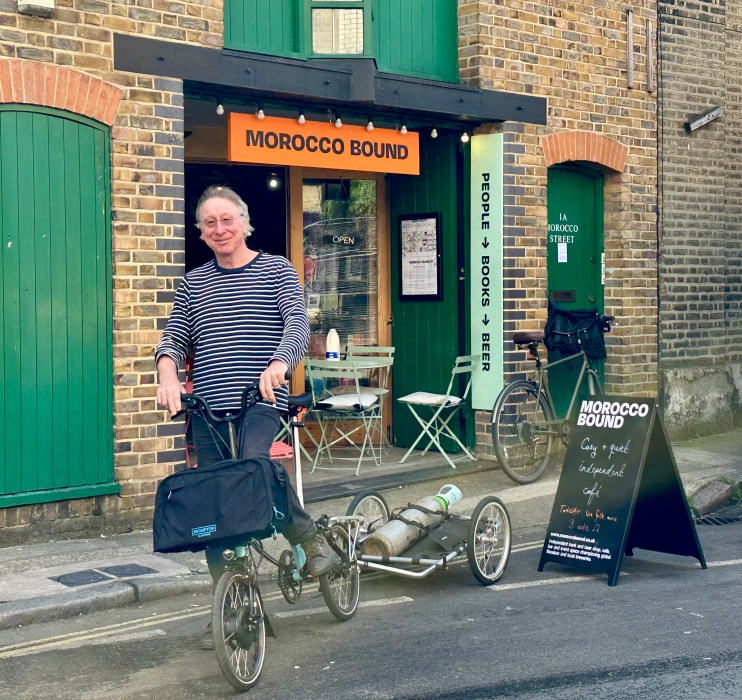Independent bookshops are thriving – as long as they offer more than just books

Morocco Bound is a lesson in adaptability. Even its owner “[doesn’t] know what to call it these days”. Music venue, community space, workshop facility hosting poetry slams, comedy nights, life drawing sessions and more, it was – originally – a book shop.
“I’m an architect,” Jonathan Dransfield, the owner, tells me. An architect who wrote a book (about children taking a trip to Mars), self-published it, and wanted to promote it.
“Someone told me the best way to sell your book is to open a book shop” and luckily Dransfield knew just the place: the bottom floor of a tall Bermondsey building that he’d built and co-owns, that he was then running a co-working space in.
So the architects were kicked out and the books brought in. Dransfield, helped by his partner’s daughter’s then-boyfriend, a creative writing student, curated the shelves and furnished the interior. He cut costs by making all the furniture by hand – using his favourite material, bamboo, and bright green African prints. Pointing to other new ventures that rack up expenses through shop design, Dransfield says opening the shop simply wouldn’t have been possible without cutting costs this way.
Before Covid, Morocco Bound was turning over a mere £1,000 a month through books and coffees. The solution? Diversification. Dransfield, who has worked in Bermondsey for 40 years and believes in supporting the local economy, had an idea – why not stock beers along with books?
Bermondsey is famous for its Beer Mile, so local breweries were the obvious choice. The shop became half beer, half books.
“On the Sunday before Covid we’d brought in buckets of beer,” Dransfield says. “Then on Monday lockdown was announced. So I had an idea – to register as an off licence. We became the only place in London where you could buy books during the pandemic.”
Morocco Bound wouldn’t have become a sustainable business had it not diversified its revenue streams away from books and coffees. Now, they make most of their money from local craft beer. And events – Morocco Bound has a rammed schedule with different events every night.
It now turns over £15,000 a month and Dransfield dreams of opening sister ventures in “arty and studenty” cities like Glasgow and Bristol.
He is grateful to the council who he feels have become “more helpful”, willing Morocco Bound’s success rather than blocking their development. He wishes the government would do more to help small businesses, who he feels are disadvantaged due to paying corporation tax whilst, he says, international firms register offshore to avoid it. The worst thing, according to Dransfield, is when independent shops close only for chains to take them over.
Morocco Bound is a stone’s throw from Bermondsey high street, a part of London that has retained a remarkable number of independent shops and restaurants. However, Dransfield has noticed more and more closures in the last year alone. Lots of brewers, he says, have had to shut up shop.
The Centre for Retail Research described last year as “brutal” for the UK’s retail sector – 47 shops closed every day last year, more than at any other point since 2017.
Yet independent booksellers are having something of a moment. The Booksellers Association reports the number of indie booksellers in the UK and Ireland rose to a 10-year high last year. There are now 1,072 in the UK, up from 867 in 2016.
Dransfield attributes a lot of the success of Morocco Bound to his staff driving the space forwards in different directions. “The biggest message I want to get across is the importance of giving staff freedom,” he says. His model is to employ younger people, give them the freedom to develop their own hobbies and projects in his space, and encourage them to move on when they want to. He describes his approach as “hands-off” and, crucially, collaborative.
Previous staff have started in-house magazines, a music scene, comedy nights, creative writing workshops and more.
The pandemic is widely seen as having reignited Britons’ love for reading – but it seems that the experience provided by independent book stores has become more and more valuable, particularly with other spaces closing up.
“The books are the mortar between the bricks,” Dransfield explains, pointing to the exposed wall outside the shop. So despite all the music, art, performance and drinking going on, the books will stay.
The writing appears to be on the wall for retailers who don’t look to offer customers an experience rather than just commodities. Especially for book shops. In the post-Amazon era, it’s not enough to just sell books. You’ve got to offer something more.